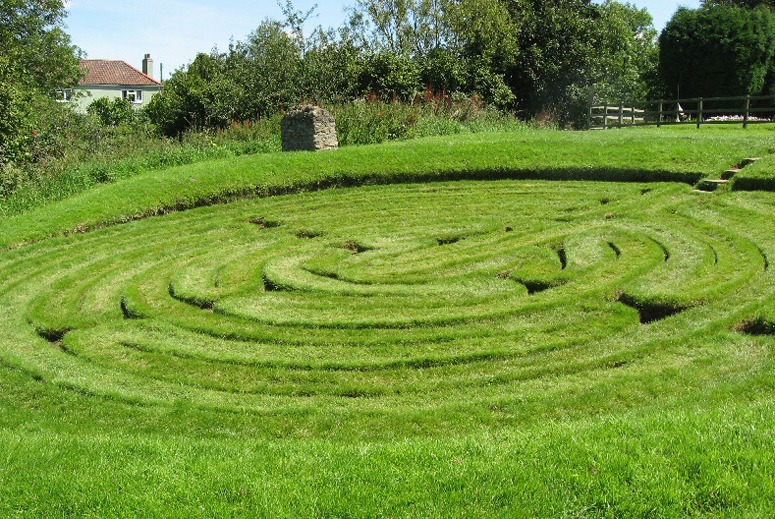
A labyrinth has a single path to its centre and was a Christian pilgrimage symbol during the middle ages.
A maze, with many blind alleys, puzzling events and difficult choices, became the setting for a garden game for six unmarried youths and six unmarried maidens. In pairs, a boy and a girl make their way in opposite directions, one centripetal and one centrifugal. Cupid, who directs the game, encourages them to kiss if they meet. They all dance when the game is over. Ringhieri, an Italian author who explained the rules in 1551, appends some questions to the rules: ‘Why is the maze blind? Why is love a maze? Is human life a maze? Why is womens’ hair like a maze? Is philosophy a maze? Is human life an inextricable maze?
The game and the questions form part of the ‘labyrinth of love’ (see, for example: Boccacio’s Corbaccio o Laberinto d’amore).
A game of love on a turf maze would be fun during a university fresher’s week – when there is everything to play for.
The maze in the photograph is on the village green at Alkborough in Lincolnshire – and I do not know if it was used for the game of love. Arthur Mee says it was cut by monks in the 12th century and White (Lincolnshire Directory (1872) that it was made by the Romans. Others think it is medieval. The excellent Labyrinthos website states that the first record of the Alkborough Turf Maze dates from the 1690s. Eight English ‘turf mazes’ survive. They are actually unicursal labyrinths and may be old – but the earliest records are from the seventeenth century. Their locations are interesting in themselves. One is in a garden; three are in the hills; four are on village greens or similar places:
Alkborough, Lincolnshire – near the village church and overlooking the Rivers Trent and Humber
Dalby, North Yorkshire – on the hills between the villages of Brandsby and Dalby
Wing, Rutland – on the edge of the village green
Hilton, Cambridgeshire – on the village green
Somerton, Oxfordshire – in a private garden
Saffron Walden, Essex – on the Town Common
Winchester, Hampshire – on a hill on the south of the village
Breamore, Hampshire – on a remote hilltop
Image courtesy Lincolnian (Brian)

The University of Cambridge had a talk on lost medieval gardens recently during the Festival of Ideas. I assume the talk included the Hilton Maze.
[ http://alumni.admin.cam.ac.uk/whatson/ideasfestival/iic_ross_street.html ]
Here also is an interesting post on the labyrinth as a spiritual journey.
[ http://originalbeauty.wordpress.com/2009/03/28/labyrinth-a-sacred-journey/ ]
The labyrinth is more interesting from the standpoints of belief and art but the maze has an appeal as a place for pleasure and fun. It is the difference between a church and a cinema.
Sometimes the two supposedly very different purposes seem to come together in the same garden space as happens in the North Carolina Forest Theatre. [ http://ncbg.unc.edu/pages/40/ ]